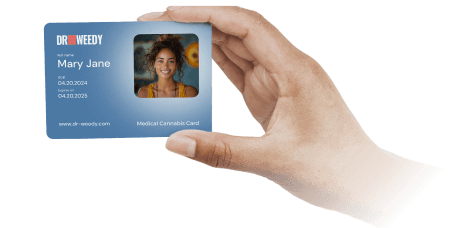Pennsylvania medical marijuana card FAQ
Finding a certified medical marijuana physician in PA is easy with Dr. Weedy. Our online platform connects patients with licensed physicians who can provide virtual consultations. Simply complete a quick application form on our website and schedule a virtual appointment with a certified doctor. Experience a secure and convenient process to obtain your medical marijuana recommendation in Pennsylvania.
The video consultation with a Pennsylvania medical marijuana doctor involves a secure and private virtual meeting. During this call, the doctor will evaluate your medical condition and discuss potential cannabis-based treatments, ensuring compliance with Pennsylvania's medical marijuana program guidelines.
In Pennsylvania, individuals with qualifying medical conditions are eligible to apply for a medical marijuana ID card. These conditions include, but are not limited to, severe chronic pain, cancer, epilepsy, and post-traumatic stress disorder (PTSD). To determine your eligibility, schedule a virtual consultation with a certified medical marijuana physician. Dr. Weedy makes the process seamless, connecting you with licensed doctors online. Check the list of qualifying conditions on our platform and start your journey to access medical cannabis in Pennsylvania.
To register as a caregiver in Pennsylvania, follow these steps:
- Determine Your Eligibility:
- Caregivers must be 21 years or older, unless authorized differently by the department.
- Eligible individuals include those designated by a patient; a parent, legal guardian, or spouse of a patient under 18; or designated by a parent, legal guardian, or spouse.
- Information Needed:
- To register, you need a valid Pennsylvania driver's license or state-issued ID card.
- If the patient is already registered, you need the patient's name, date of birth, and patient ID number.
- Select Caregiver Option During the Registration:
- Adult Patient Caregiver Registration: Registering for an adult patient already in the system.
- Caregiver Registering for an Existing Patient: Registering for a patient already in the system but not visiting a dispensary.
- Caregiver Registering for a New Patient: Registering for a patient not yet in the system and not visiting a dispensary.
- DOH-Approved Caregiver Registration: Allows the Department of Health to share your contact information with patients in need of a caregiver.
- Complete the Registration Steps:
- Register on the official website https://www.pa.gov/cannabis/caregivers/).
- Undergo a criminal background check.
- Wait for an email with the background check outcome.
- Pay for an ID card if approved as a caregiver.
- Association with a Patient:
- Before registering, obtain the patient's ID number and date of birth.
- Enter this information on the registration screen.
- If already registered but not linked with the patient, the patient needs to add you through the "Manage Caregivers" tab.
- Access the 'Manage Patients' tab in Your Caregiver Profile to view all associated patients.
- Caregivers may provide care for an unlimited number of patients.
In Pennsylvania, medical marijuana is available in six forms post-card issuance, each tailored for specific therapeutic needs:
-Pills/Capsules: These contain THC and CBD, offering relief from pain, inflammation, and nausea, with a slower onset but longer-lasting effects.
-Liquids/Tinctures: Potent extracts taken orally or under the tongue, useful for quick absorption and versatility in use, including vaporization.
-Topicals: Gels, creams, and ointments for localized pain relief and anti-inflammation, non-psychoactive as they don’t enter the bloodstream.
-Extracts: Including shatter, wax, oil, budder, and resin, these are inhaled or vaporized forms offering concentrated effects from specific plant molecules.
-Patches: Deliver cannabinoids like CBD, CBN, THC, and THCA through the skin for prolonged effects, suitable for consistent relief over time.
-Flower/Dry Leaf: Vaporized form of marijuana, containing a range of cannabinoids like THC and CBD, each with different health benefits.
To apply for a medical marijuana card in Pennsylvania, you will typically need the following documents:
- Valid photo ID: Like a driver's license or passport.
- Proof of Residency: A Pennsylvania driver's license or state-issued ID card.
- Medical Records: Relevant medical records documenting your qualifying medical condition.
Yes, maintaining the confidentiality of your personal information is a priority during the application process. Dr. Weedy and the Pennsylvania Department of Health adhere to strict privacy and security standards to protect your sensitive data. Information shared during the application process is handled in accordance with applicable laws and regulations to safeguard patient privacy.
While Dr. Weedy strives to provide comprehensive support throughout the application process, it's important to note that no service can guarantee the approval of a medical marijuana card. The approval decision lies with the registered physicians who evaluate your medical condition. Dr. Weedy facilitates the process, connects you with qualified physicians, and ensures that your application is complete and accurate. However, the final decision rests with the evaluating healthcare professional.
No, medical marijuana cards in Pennsylvania do not renew automatically. Cardholders are required to manually initiate the renewal process. This process involves re-evaluation by a certified physician and submission of the necessary documents before the current card expires.
In Pennsylvania, the renewal of a medical marijuana card is required on an annual basis. This yearly renewal ensures that patients continue to meet the state’s eligibility criteria for medical marijuana use and have up-to-date certifications from their healthcare provider.
Upon expiration of your medical marijuana card in Pennsylvania, your legal authorization to purchase and use medical cannabis from licensed dispensaries ceases.
Yes, you can initiate the renewal process up to 60 days before your current card expires. This ensures a smooth transition without interruptions in your access to medical cannabis.
The application fee for renewal is the same as the initial application fee. It's essential to check the current fee structure to ensure you submit the correct payment.
If your renewal application for a medical marijuana card in Pennsylvania is denied, it could be due to various reasons such as incomplete documentation or changes in eligibility criteria. In case of denial by our certified physician at Dr. Weedy, rest assured, we refund 100% of your payment. We guide you through the process, ensuring all requirements are met to avoid denials. If your application faces denial from the state, you may appeal the decision or reapply once the issues are resolved.
In Pennsylvania, chronic pain is recognized as a condition that may qualify individuals for medical cannabis treatment. Patients with persistent pain that significantly impacts their daily activities may be eligible for this form of therapy.
Yes, having a criminal record does not automatically disqualify you from obtaining a medical marijuana card in Pennsylvania. However, the nature of your criminal record might influence your eligibility, especially if it involves certain drug-related offenses.
No, as of the current regulations in Pennsylvania, home cultivation of marijuana is not permitted for medical marijuana patients. The state's medical marijuana program strictly regulates the cultivation, processing, and distribution of medical cannabis. Therefore, patients are not authorized to grow marijuana plants at home.
To access medical marijuana, patients in Pennsylvania must obtain it from state-licensed dispensaries, where a variety of forms, including pills, tinctures, and vaporizable products, are available. The program emphasizes the importance of obtaining medical cannabis through legal and regulated channels to ensure product safety and adherence to state laws.
It's crucial for patients to stay informed about any updates or changes in regulations regarding home cultivation by checking the official website of the Pennsylvania Department of Health or consulting with their healthcare providers.
No, you cannot consume medical marijuana anywhere in Pennsylvania without restrictions. The state has regulations in place regarding the use of medical marijuana to ensure public safety and adherence to the law. Here are key points to consider:
- Private Residences: Consumption is generally allowed in private residences, but it's essential to respect the rules of your landlord if renting.
- Designated Areas: Some medical marijuana dispensaries may have designated areas for consumption. It's advisable to inquire about such provisions at the respective dispensary.
- Prohibited Places: It is illegal to consume medical marijuana in public places, on school grounds, in the workplace (unless otherwise specified by the employer), and in any form of public transportation.
- Vehicle Use: It is against the law to use medical marijuana while operating a vehicle. This includes not only driving but also being in physical control of a vehicle, which includes sitting in the driver's seat with the keys in the ignition.
In Pennsylvania, qualified patients are allowed a 90-day supply of medical cannabis. This is based on individual doses, ensuring continuous access to medication. Key points include:
- 90-Day Supply: Patients or caregivers may not possess more than a 90-day supply of individual doses.
- 30-Day Periods: During the last seven days of a 30-day period, patients can obtain a 90-day supply for the next 30 days.
- Renewal: Additional 90-day supplies can be provided for the card's authorized period.
No, it is illegal to give your medical marijuana to someone else. Medical marijuana is strictly for the use of the patient to whom it is prescribed. Sharing or distributing medical marijuana to others is against the law and can result in legal consequences.
No, medical marijuana is not covered by insurance in Pennsylvania. Currently, insurance providers do not cover the costs associated with obtaining medical marijuana, including the consultation fees and the purchase of medical marijuana products from dispensaries. Patients are responsible for these costs out of pocket.
To obtain a medical marijuana card in Pennsylvania, you need to be a resident of the state and provide a Pennsylvania driver's license or a state-issued ID card. Having a Pennsylvania ID is a requirement for eligibility in the state's medical marijuana program.
No, Pennsylvania does not recognize out-of-state medical marijuana cards. To purchase and use medical marijuana in Pennsylvania, individuals must obtain a medical marijuana card specifically issued by the Pennsylvania Department of Health. Out-of-state cards do not grant access to Pennsylvania's medical marijuana program.
Get your medical marijuana card
Plant your health with Dr. Weedy. Get all the benefits of a medical card at a low price for a year



























